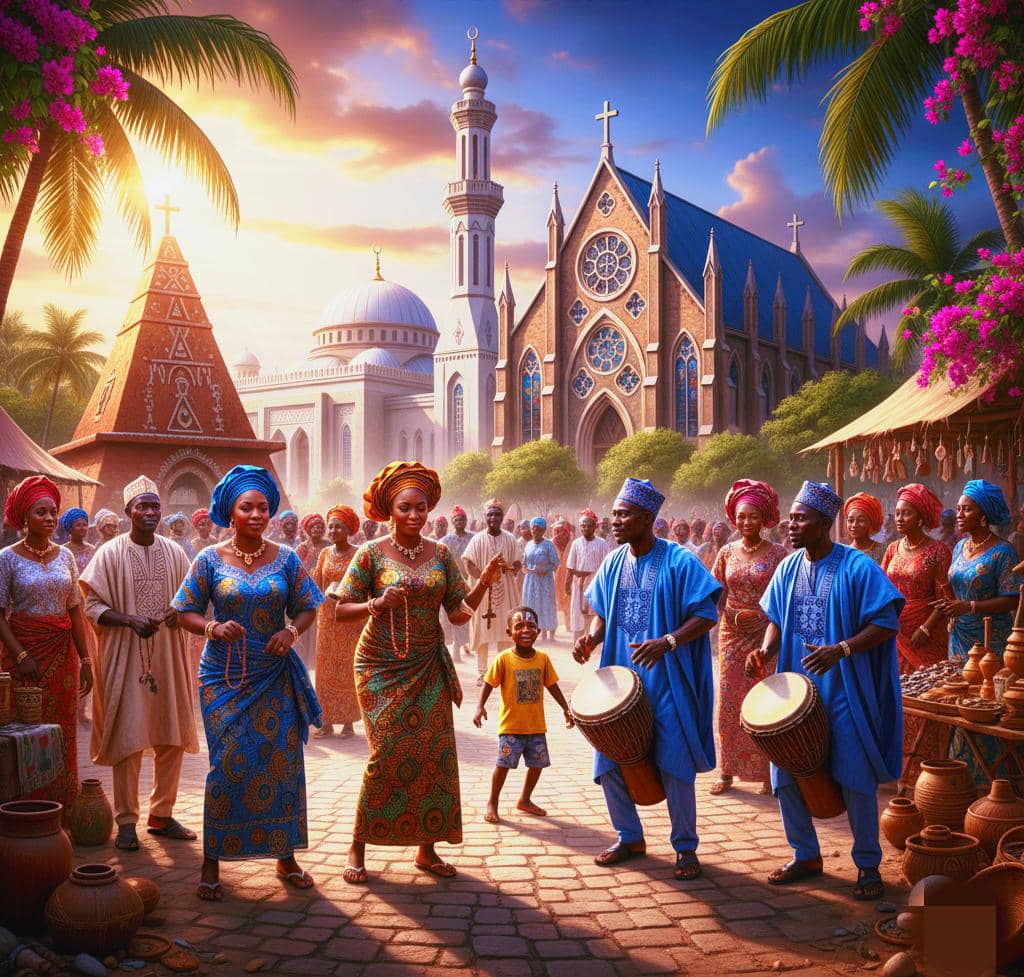Nigeria is one of the most culturally and religiously diverse nations in the world.
With over 250 ethnic groups, each with unique languages, customs, and traditions, the country’s identity is a rich mix of faith and heritage.
Religion in Nigeria cannot be separated from culture; both have shaped and influenced each other for generations, creating a unique blend that defines how Nigerians live and believe.
Before foreign religions
Before the arrival of Islam and Christianity, Nigerians already had strong traditional religions. These traditional beliefs guided how people lived, worked, and related to one another.
Every ethnic group had its own gods, spirits, and ancestors. The Yoruba worshipped deities like Sango (god of thunder), Ogun (god of iron), and Osun (goddess of fertility).
The Igbo people believed in Chukwu, the supreme being who created everything. The Hausa people also practiced various forms of spiritual worship before Islam became dominant.
Read Also: Nigeria’s job hunt crisis: Why getting a job now is harder than ever
Traditional religion was part of daily life. People prayed for rain, good harvests, protection, and peace in the community.
Festivals, music, dances, and storytelling were all part of worship. Religion was not something separate, it was part of culture, family, and community life.
How Islam came to Nigeria
Islam was the first foreign religion to enter Nigeria. It arrived around the 11th century through traders and scholars from North Africa.
These Muslim traders brought not only goods but also their faith. They first introduced Islam to the Kanem-Bornu Empire in the northeastern part of the country.
Through trade, intermarriage, and education, Islam spread to the Hausa kingdoms in northern Nigeria by the 14th century.
Many people accepted Islam because it came with literacy and new forms of learning. Arabic schools were established where people learned to read and write, and Islamic law helped guide governance.
In the early 19th century, Islam grew even stronger after Usman dan Fodio, a Fulani scholar, led a major religious reform movement known as the Sokoto Jihad.
His goal was to purify the religion and promote fairness and justice. This movement led to the creation of the Sokoto Caliphate, which became one of the largest Islamic empires in West Africa.
Today, Islam remains the dominant religion in northern Nigeria, influencing the region’s laws, dress, education, and festivals.
How Christianity reached Nigeria
Christianity came to Nigeria later than Islam. The first Christian missionaries arrived with Portuguese traders in the 15th century, but their influence was small and short-lived.
The real spread of Christianity began in the 19th century with the arrival of British missionaries.
Missionary groups like the Church Missionary Society (CMS), Roman Catholic Mission, and the Methodist Missionary Society established churches, schools, and hospitals.
They focused on spreading the gospel and teaching Western education. Over time, Christianity took deep root in southern Nigeria, especially among the Yoruba, Igbo, and some minority groups in the Niger Delta.
One of the most notable figures in this era was Bishop Samuel Ajayi Crowther, a former slave who became the first African Anglican bishop.
He helped translate the Bible into Yoruba and promoted Christianity in a way that respected local languages and culture.
As a result, Christianity blended with Nigerian traditions and created a unique form of worship that continues today.
How Culture Shapes Religion
Even though Islam and Christianity came from outside Nigeria, local culture has greatly shaped how both religions are practiced. Nigerians have added their own flavor to religious life.
In churches, traditional drums, songs, dances, and colorful local attire are used during worship. Festivals like Christmas and Easter are celebrated with Nigerian food, family gatherings, and cultural events. Similarly, Muslims celebrate Eid with large feasts, local music, and community prayers.
The Durbar Festival in northern Nigeria is a perfect example of how religion and culture mix. It is celebrated during Muslim festivals and features horse parades, traditional clothes, and royal displays, a beautiful combination of Islam and Hausa culture.
Mixing Religion and Tradition
Across Nigeria, cultural traditions still play an important role in religious life. Marriage, naming, and burial ceremonies often combine religious and traditional practices.
For instance, before a Christian church wedding, most families hold a traditional marriage ceremony where dowries are paid and families give their blessings.
In Muslim weddings, Hausa and Fulani cultural elements, like local music, native attire, and traditional gifts, are added to the Islamic rites.
Even outside ceremonies, many Nigerians mix religion and tradition in daily life. Respect for elders, family unity, and communal living are traditional values supported by both Islam and Christianity.
Balancing Faith and Culture
Sometimes, there are disagreements between culture and religion. Some religious groups reject traditional practices, calling them unholy or outdated. This creates tension in some communities, especially where ancient customs are still strong.
However, most Nigerians have found a middle ground. Many families include people from different faiths, Muslims, Christians, and traditional worshippers, living peacefully together.
In cities like Lagos, Abuja, and Kaduna, people often celebrate one another’s religious festivals and share in each other’s joy. This harmony shows the strength of Nigeria’s cultural tolerance.
Culture and religion work hand in hand
The influence of culture on religion in Nigeria is deep and long-lasting. Culture makes religion more relatable to the people by adding color, meaning, and connection to local life.
In return, religion strengthens good cultural values like honesty, respect, peace, and unity.
From mosques in Kano to churches in Enugu and traditional shrines in Osogbo, each form of worship carries the same message of faith, morality, and community.
Nigeria’s story is not one of conflict between culture and religion but of balance and coexistence.
Together, they shape how Nigerians think, live, and express their beliefs, proving that in this country, culture and religion are not separate worlds, but two forces working hand in hand to define its rich identity.



